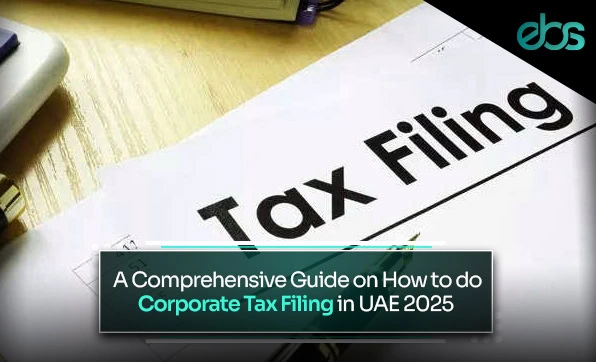The introduction of corporate tax within the UAE marks a considerable shift within the country’s tax landscape. Effective from June 1, 2023, this tax is aimed toward selling monetary boom and aligning with worldwide tax standards. As companies put together for their first corporate tax submitting due through September 30, 2025, it’s important to recognize the requirements and approaches involved in corporate tax filing UAE is essential for ensuring compliance and optimizing business operations.

Overview of Corporate Tax Rates
The corporate tax structure within the UAE is designed to be straightforward, with various fees primarily based totally on profit levels:
| Taxable Income | Corporate Tax Rate |
| Up to AED 375,000 | 0% |
| Above AED 375,000 | 9% |
| Large Multinational Companies | 15% (if relevant) |
This tiered method guarantees that smaller companies benefit from a decreased tax burden at the same time as large businesses contribute extra appreciably to national revenues.
Key Steps to File Corporate Taxes
Filing corporate taxes in Dubai involves several key steps, which ensures that the business always remain compliant with within the UAE tax laws:
1. Register Your Business
Before submitting taxes, companies have to sign up with the Federal Tax Authority (FTA). This consists of acquiring a Tax Registration Number (TRN), which is important for all tax-associated communications. The registration technique calls for diverse documents, including:
- Trade license
- Memorandum of Association (MOA)
- Emirates ID and passport copies of commercial enterprise owners
- Financial statements
2. Maintain Accurate Records
Proper record-keeping is important for compliance. Businesses have to hold targeted economic data that adhere to International Financial Reporting Standards (IFRS). This consists of:
- Income statements
- Balance sheets
- Cash float statements
This data has to be stored for at least seven years following the end of the tax duration to facilitate audits and ensure compliance with policies.
3. Calculate Taxable Income
To decide taxable profits, companies want to calculate their overall profits and deduct allowable expenses. This calculation has to keep in mind diverse deductions and allowances to be had beneath UAE tax law, which could assist lessen the general tax legal responsibility.
4. Complete the Tax Form
Once taxable profits are calculated, companies have to enter the corporate tax go-back structure to be had at the FTA’s EmaraTax portal. This structure calls for targeted records of approximately profits, expenses, and any relevant deductions.
5. Submit Online
After finishing the tax structure, companies have to post it online through the FTA portal. The deadline for submission is 9 months after the end of the economic 12 months. For maximum groups who’s financial 12 months end on December 31, 2024, this indicates filing through September 30, 2025.
UAE Corporate Tax Filing Deadlines
Understanding submitting closing dates is essential to keep away from consequences:
- For Companies Established in 2023: The preliminary filing deadlines has been prolonged to December 31, 2024.
- General Filing Deadline: For groups with a financial 12 months finishing December 31, 2024, the deadline is September 30, 2025.
- Non-calendar fiscal years: Different closing dates are observed, primarily based on character financial year-end dates.
Penalties for Non-compliance
Failure to conform with submitting closing dates or inaccuracies in submissions can bring about considerable consequences. Businesses may also face fines beginning from AED 10,000 for overdue submissions or wrong filings. Therefore, well-timed training and submission are important.
Benefits of Corporate Tax Compliance
While corporate tax filing process may also appear burdensome, compliance gives numerous advantages:
- Enhanced Credibility: Compliance complements a commercial enterprise’s popularity with stakeholders and investors.
- Access to Government Contracts: Many authorities’ contracts require evidence of tax compliance.
- Financial Planning: Understanding tax duties permits companies to devise price ranges more effectively.
Conclusion
Filing corporate taxes within the UAE calls for cautious planning and adherence to policies. By hiring a corporate tax advisor in dubai, business can get better understanding from business-registration and record-keeping to filing the tax return—companies can navigate this new panorama successfully. As the primary filing deadlines approaches on September 30, 2025, taking proactive measures will ensure compliance and mitigate risks related to consequences or audits.
FAQs:
What is the corporate tax rate in the UAE for 2025?
The corporate tax rate is generally 9% for businesses with profits exceeding AED 375,000.
When is the corporate tax filing deadline in the UAE?
The deadline for filing is typically within 9 months after the end of the financial year for most companies.
Do all businesses in the UAE need to pay corporate tax?
Not all; some businesses in free zones may qualify for tax exemptions under specific conditions.
How can I prepare for corporate tax filing in the UAE?
Keep accurate financial records and consult a tax professional for compliance and precise filing.

